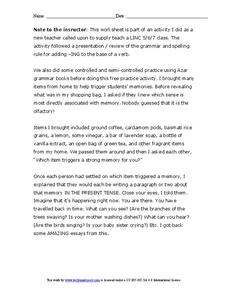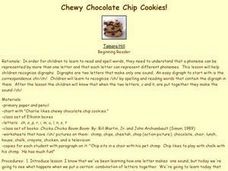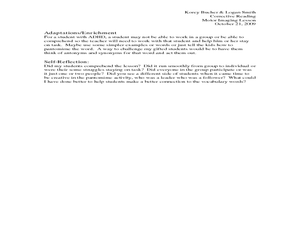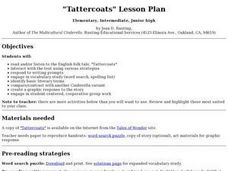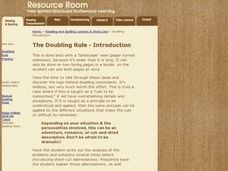Mathed Up!
Scatter Graphs
Make an estimate by getting in line. The class works with scatter plots and lines of best fit to make an estimate for given values. Pupils determine whether there is a positive or negative correlation and draw a best-fit line. Using the...
Mathed Up!
Angles: Parallel Lines
Viewers are presented with seven problems with parallel lines and angle relationships and must use the given information to find the measures of specific angles. To finish, they explain their process in finding the measures in the...
Mathed Up!
Angles in Triangles and Quadrilaterals
This short video show viewers how to connect the sum of the angles in a triangle to other angle measurements. Pupils determine the missing measures for angles involved with triangles and quadrilaterals. Class members then must explain...
Mathed Up!
Enlargements
Make enlargements with and without centers. Pupils work through seven problems dealing with dilations or enlargements. The first couple items are strict enlargements without centers, while the others have centers. Class members also...
Mathed Up!
Pie Charts
Representing data is as easy as pie. Class members construct pie charts given a frequency table. Individuals then determine the size of the angles needed for each sector and interpret the size of sectors within the context of frequency....
Curated OER
Scent-Inspired Composition
Our sense of smell has a wonderful way of bringing back memories. Unlock those memories with an olfactory-inspired writing prompt that challenges writers to tell a story about a specific smell and the memories it conjures.
Curated OER
Shout Out Loud
Students explore the /ow/ sound using the 'ou' digraph. They recite an /ow/ tongue twister and participate in a letterbox lesson to gain understanding of the ou = /ow/ concept. They read 'The Napping House' to practice reading with /ow/...
Curated OER
Alphabet
Students state the letters of the alphabet individually and in new words. For this alphabet lesson plan, students use the alphabet in a variety of ways during reading.
Curated OER
"OU" O U Hurt Me!
Students explore the digraph ou=/ow/ in written and spoken words. They practice writing words with the ou=/ow/ digraph. Students match phonemes in words they hear. Students read The Napping House and identify words with the ou=/ow/ digraph.
Curated OER
Compound Word Games
Students build compound words out of two separate words using a variety of activities. For this compound word lesson plan, students practice building compound words using word cards. These word cards can be used in a variety of ways to...
Curated OER
Language Tutorial
Fourth graders practice using vowel teams and pronunciations. In this language lesson, 4th graders complete visual, auditory, and phonemic drills, review spellings of words, and echo dictated words. Students also read chorally and...
Curated OER
Ow! That Hurts!
Students identify the diagraph of ow coming together to make one sound. They read words containing this diagraph and spell words too. In the story, The Napping House, each pair of students finds -ow words. As an assessment, students...
Curated OER
Sh! Sh! Stop that Noise!
Students practice reading, writing, and spelling words that contain the /sh/ digraph. Students participate in a chant using /sh/ digraph words. They then use Elkonin boxes to spell words containing the digraph. They complete a worksheet...
Curated OER
P is for P-P-Pumpkin
Students examine the letter 'p'. Through instruction and modeling they explore the sound the letter makes, how to make the sound with their mouths, how the letter is written, etc. They say tongue twisters with the /p/ sound in them. They...
Curated OER
Mr. Cloak Loads his Boat with Oats
First graders distinguish between the sounds for short vowel o and long vowel o. They are introduced to the vowel patterns that comprise long vowel sounds, with a particular emphasis on /oa/. They practice reading and identifying a...
Curated OER
Pop, Pop, Popcorn
Students examine the sound of the letter "P,p" and how to write it using a tongue twister. They examine how their mouths move when the make the letter sound before writing it on primary paper. While listening to a read aloud of William...
Curated OER
Keira Knightley
In this famous leaders worksheet, students read a passage about Keira Knightley and then complete a variety of activities including spelling, cloze, synonym matches, and scrambled sentences.
Curated OER
Ow! That Hurts
Pupils study the ou=/ow/ correspondence in written and spoken words using a tongue twisters and a letterbox instructional activity. They recite the tongue twister and make given words using the letterboxes. Next, they listen to a read...
Curated OER
"EA" Beach
Students are introduced to their new spelling words for the week which have the sound "ea". In groups, they brainstorm a list of other words with the same sound, draw them and write them on a worksheet. They share their new words with...
Curated OER
Chewy Chocolate Chip Cookies!
Students complete a variety of activities related to the /ch/ digraph. As a class recite a tongue twister, and identify the words containing the /ch/ sound. Students then spell different words containing the /ch/ digraph using letter...
Curated OER
"A" What Did You Say?
Students complete a variety of activities related to the long /a/ sound represented by the /ay/ correspondence. They spell different words containing the /ay/ correspondence using letter manipulatives, and identify words they hear the...
Curated OER
Acting Out as we Go
Fourth graders use motor imaging to remember the definitions of words. In this vocabulary lesson, 4th graders work in groups to make a pantomime to help them remember a word. Students document the experience in their notebooks.
Curated OER
Tattercoats
Students read the English folktale, "Tattercoats," identify basic literary terms, and respond to writing prompts. They compare and contrast with another Cinderella story version and create a graphic response to the story.
Curated OER
The Doubling Rule
Students practice the rule for doubling the final consonant of a word when adding a suffix. Through guided practice and class discussion, they identify the spelling patterns that require letter doubling. Students practice doubling by...







